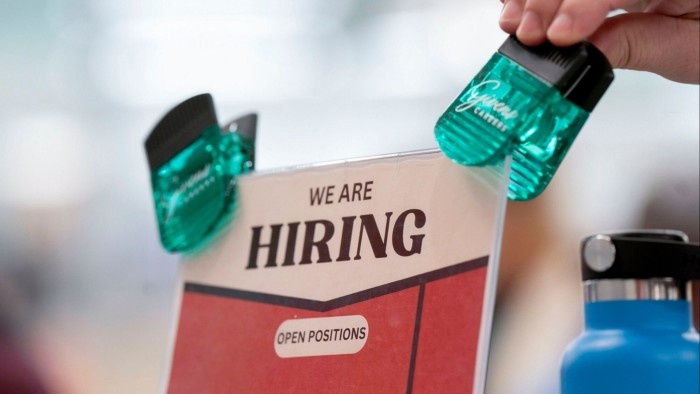Stay informed with free updates
Simply sign up to the Global Economy myFT Digest — delivered directly to your inbox.
US jobs numbers are expected to rebound when the latest figures are published on Friday, offering investors the latest clue on the path of interest rates ahead of the inauguration of president-elect Donald Trump.
Economists polled by Reuters forecast that the US economy added 183,000 jobs in November, up from 12,000 the previous month, a figure distorted by the impact of hurricanes and a Boeing strike.
Joe Maher, assistant economist at Capital Economics, said that the October figures had been the result of “temporary disruptions” but that a “very soft non-farm payrolls print may also partly reflect some genuine weakness in the labour market” providing support for more cuts by the US Federal Reserve.
Since Trump’s election victory, investors have bet that the inflationary impact of the president-elect’s tariffs and tax cuts will cause the Fed to lower rates more slowly than previously thought.
The US central bank cut rates by 0.25 percentage points days after the election to a range of 4.5 per cent to 4.75 per cent. Swap markets have priced in a 65 per cent probability of another quarter point cut when the Fed meets later this month.
Fed chair Jay Powell said last month that the central bank was in no hurry to slash borrowing costs amid signs of a resilient economy with low rates of joblessness. But he acknowledged the Fed still had a challenge balancing joblessness and inflation.
“We are confident that with an appropriate recalibration of our policy stance, strength in the economy and the labour market can be maintained, with inflation moving sustainably down to 2 per cent,” Powell said at a press conference. Rafe Uddin
Can France calm investor nerves?
France’s political instability is weighing on its government bond and stock markets, as traders fret about the fate of both Michel Barnier’s crunch budget and his minority government.
The spread between France’s 10-year bond yield and that of Germany’s, the Eurozone benchmark, reached as high as 0.9 percentage points last week, its highest since the bloc’s sovereign debt crisis 12 years ago. Paris’s borrowing costs briefly climbed above those of Greece, a symbolic moment for the two economies.
The Cac 40 stock index, meanwhile, has also underperformed its peers recently, as the dimmer outlook unsettles investors in big financial companies and other stocks exposed to the domestic economy and its bond market.
There could be fresh challenges this week, with a vote on social security that could prompt a vote of no confidence in Barnier, though a push-and-pull over areas of the Budget between the government and Marine Le Pen’s far-right party could reduce some of the political heat.
France’s government bond yields remain low in historic terms, and nowhere near the levels Greece and other crisis hotspots reached during the sovereign debt crisis. Other indicators of worries over Eurozone sovereign debt more broadly, such as Italy-Germany spreads, are also muted.
But some investors worry what the worsening fiscal situation for the second-biggest Eurozone economy will mean for the bloc. Robert Burrows at M&G Investments warned last week that it has “profound implications for the European Union as a whole”.
“While the EU has survived numerous challenges in the past, France’s ongoing struggles could spark renewed debates over fragmentation, threatening the unity that has been a cornerstone of the European project for decades,” he added. Ian Smith
Will Opec boost production this week?
Opec+, the oil cartel, meets on Thursday to discuss whether its members can start to gradually pump more crude or whether they should continue to hold production at current levels.
In an effort to shore up prices, the group, led by Saudi Arabia and Russia, have collectively made some 5.86mn barrels a day of production cuts over the past few years. In June, the group said it would continue to hold the majority of that oil off the market, but would gradually start unwinding 2.2mn b/d of voluntary cuts from September.
But that move was then pushed back because of weak oil demand from China and a growing supply of crude from non-Opec countries such as the US. This week, the group is likely to postpone further any increase in production, at least until there is more clarity over how the incoming Trump administration will enforce crude sanctions on Iran and Venezuela. Analysts expect the cuts to be extended for one or two months.
But a last-minute delay to the meeting itself, which was due to be held on Sunday, could hint at division inside Opec. Several members have been pumping above their quotas, despite Opec’s efforts to enforce compliance, and some countries, such as Kazakhstan, are keen to grow their share.
While the firm consensus among analysts is for a one to two month further extension of the cuts, some warned that Saudi Arabia, led by oil minister Prince Abdulaziz bin Salman, could spring a surprise at the meeting and allow production to start rising. Malcolm Moore
Read the full article here

